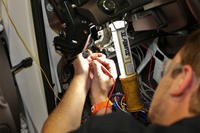Content provided courtesy of USAA.
If buying a car were only as simple as buying a pack of gum — pick a flavor, plunk down your cash and go on your way. But buying a new vehicle involves enough financial decisions to make your head spin.
"Even after you've chosen the vehicle itself, the way you handle the purchase can have a significant impact on your long-term financial security," says JJ Montanaro, a CERTIFIED FINANCIAL PLANNER™ with USAA.
Here are four decisions you're likely to face and some guidance to help you get the most for your money.
1. How much cash should I pay upfront?
Some buyers with substantial savings decide to pay cash for their vehicles to avoid car payments or interest. But forking over $30,000 may not be the best idea. "Paying cash for a car can be a mistake," says Lauren Fix, known as The Car Coach®, a nationally recognized automotive analyst. "You could make better use of that cash."
For example, if paying cash leaves your emergency fund depleted and something bad happens, you may be forced to borrow money at much less favorable terms. For most shoppers, buying in cash isn't even an option — they need a loan just to afford a car. However, financing the entire purchase also may be unwise.
Taxes and fees add to the sticker price, so with no down payment, you'll owe more than the car is worth as soon as you drive off the lot. And depreciation could leave you further "upside-down" on your loan. If you need to sell the car or if it's totaled in an accident, you'll get less money than you need to pay off the loan and may have to pay thousands of dollars out of pocket.
Montanaro recommends making a down payment of 15 to 20% of the purchase price.
2. Where should I get a loan?
The dealership is one place to secure vehicle financing, but Fix recommends shopping around.
"You might find lower interest rates at your credit union or other lending organizations where you're a member," she says. "They will be more likely to work with you on the terms."
Fix also recommends getting preapproved for an auto loan before you're ready to buy. With a loan lined up, you can focus on negotiating the price and not fall prey to slippery sales tactics. If the dealership offers you a better financing deal, that's even better. Make sure you look for application fees, other miscellaneous fees and your loan term so you are making an apples-to-apples comparison between loans.
Be on the lookout for offers to lower your interest rate through a lender, vehicle manufacturer or dealership.
3. How long should the loan be?
The longer the loan period, the smaller the monthly payments will be. That tempts many car buyers to finance their cars over five, six or even seven years. Not wise, says Montanaro.
"Opt for a vehicle that you can comfortably pay off in three to five years," he says. "If you have to go longer than that to afford the payments, you should choose a less expensive car."
Ultra-long loans are risky for two reasons. First, stretching out your payments means you'll pay more interest. And, typically, a longer loan term comes with a higher interest rate. Second, since new vehicles typically depreciate quickly, a longer loan increases your likelihood of being upside-down.
"Never finance a car for longer than you plan to own it," Fix adds.
4. What's the best incentive?
Many dealers will offer either low-rate financing or a hefty cash rebate on a new vehicle. Which is better?
"You have to analyze the numbers on both offers," Fix says, "and read the fine print to find out which will lower your payments more."
Use an auto loan payment calculator to guide your decision. And if you can take the dealer's rebate and find a low-rate loan from a third-party lender, it might be possible to have your cake and eat it, too.-









